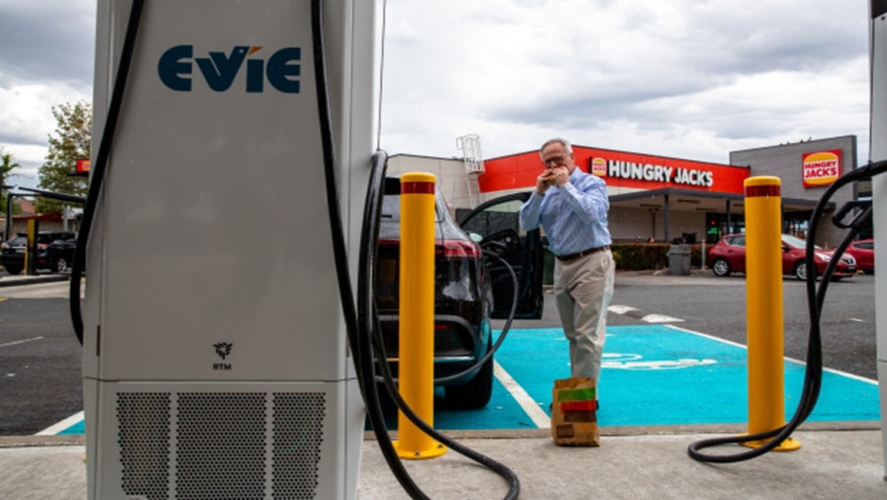The chief executive of electric vehicle charging infrastructure company Evie Networks says a deal with Rich Lister Jack Cowin’s Hungry Jack’s fast food chain is a forerunner of a “paradigm shift” in its early stages where convenient sites in cities will gradually replace a traditional trip to a service station.
Chris Mills says convenience is the No.1 priority for electric vehicle owners, most of whom will continue to recharge vehicles at home or in the workplace.
Putting fast-charging infrastructure at locations such as quick-service restaurants, libraries or local council hubs, which are part of the normal patterns of daily life, is central to the continued trialling of the best locations.
“It’s what people will find the most convenient to get to,” Mr Mills said.
“It’s unshackling drivers from in essence being a prisoner to a petrol station,” he said.
The first of the fast-charging units is located at the Hungry Jack’s outlet at Cabramatta in Sydney’s south-west. Mr Mills said a further seven sites in other cities at Hungry Jack’s outlets are in the planning stage.

Chris Mills, CEO of Evie Networks, at the Hungry Jack’s outlet at Cabramatta in south-west Sydney.
Evie Networks is fully owned by the St Baker Innovation Fund, an entity operated by energy entrepreneur Trevor St Baker. The fast-charging stations are being manufactured by Tritium, a fast-growing company in which Mr St Baker is an investor. Tritium is preparing to list on the Nasdaq exchange in the United States.
Evie Networks currently has 53 fast-charging stations at various sites around Australia. Mr Mills said the group tested different locations and if one was found to attract only low levels of activity the company would shift to a different site. Mr Mills said the $100 million St Baker Innovation Fund is a big backer of an entrepreneurial approach.
“We try things. If we fail, we hope to fail really quickly, and move on fast,” he said.
Evie Networks is also using $8.85 million from the federal government’s Future Fuels Fund, which was announced in July. Ampol, France’s Engie, Chargefox and Electric Highways Tasmania also secured grants.
There are 440 Hungry Jack’s outlets in Australia. Hungry Jack’s chief executive Chris Green said the partnership with Evie Networks would help expand the national footprint of electric vehicle charging infrastructure. He also emphasised the importance of convenience, with drivers able to recharge while ordering a meal.
Hungry Jack’s founder Jack Cowin is a large investor in plant-based meat group v2food, which has now raised a combined $185 million since November 2019 and is valued at around $500 million. Hungry Jack’s has been using v2food patties in its Rebel Whopper burger at the group’s outlets since late 2019. Mr Cowin is No.17 on the Financial Review Rich List, with an estimated personal wealth of $4.94 billion. Hungry Jack’s is also pushing hard into the fried chicken segment, where rival KFC is making strong gains.
Mr Mills said about one-fifth of Australia’s electric vehicles are in NSW and so it was logical to set up the first of the Hungry Jack’s sites chargers in Sydney.
Petrol station giant Ampol began a trial in mid-2020 with Evie Networks for electric vehicle charging stations at some of its highway locations. The first was installed last year at a service station at Avenel, 115 kilometres north of Melbourne. Ampol has since decided to go it alone with its own strategy, and is rolling out fast-charging bays at more than 100 sites across the company’s network of petrol stations. The sites will include Sydney, Melbourne, Brisbane and Perth, as well as regional centres such as Newcastle, Gold Coast and Geelong.
Ampol three weeks ago announced a proposed $1.9 billion acquisition of New Zealand petrol retailer Z Energy to accelerate the shift.
Subscribe to our free mailing list and always be the first to receive the latest news and updates.
